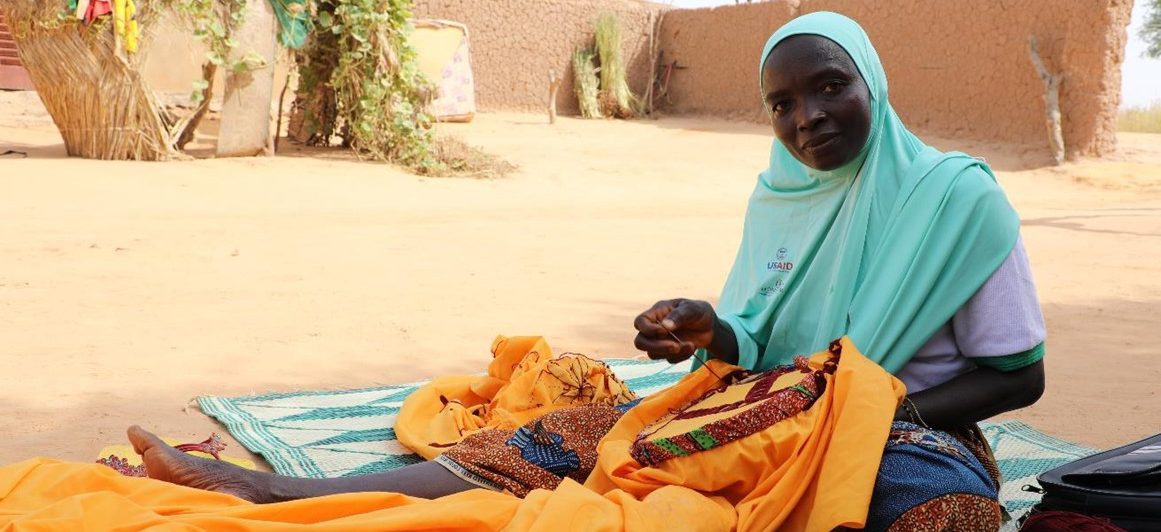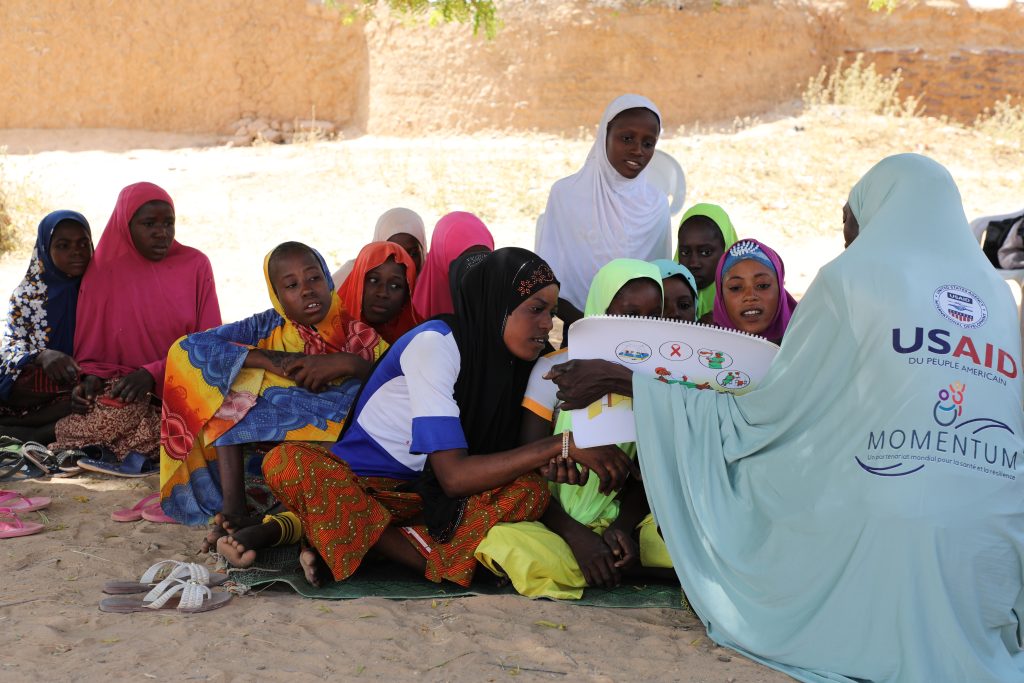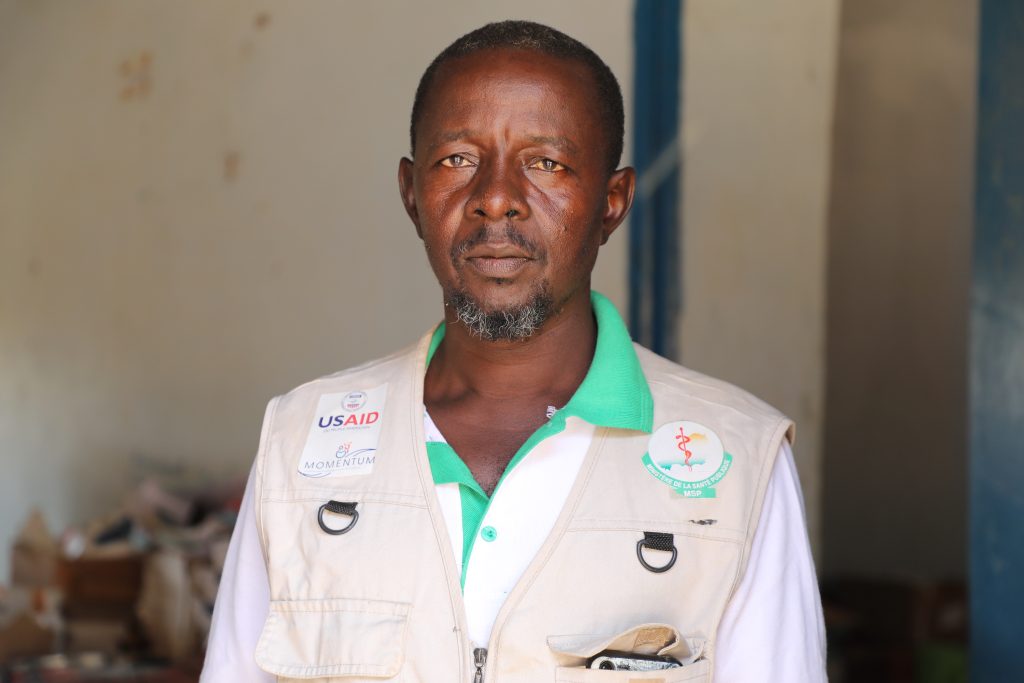“There Can Be No Harmony in a Household Where Terror Reigns.” Community Health Workers Facilitate Meaningful Change in One Niger Village
Published on November 22, 2023

By Hadjara Laouali Balla, Communication and Knowledge Management Advisor, Niger, MOMENTUM Integrated Health Resilience
Fati Abdou, 38, lives in a large compound with her husband of 18 years, Moussa, their three children, and her mother-in-law in the village of Darey Maliki. The village is about four kilometers from the town of Dosso in southwest Niger, not too far down the dusty main highway from the country’s capital Niamey. When she’s not busy with her community duties, Fati works on hand embroidery. During the rainy season from May to September she grows cowpeas, millet, and peanuts for her family and for sale in times of need.
Fati has been working with MOMENTUM Integrated Health Resilience as a community health worker (known in Niger as a Relais Communautaire, or RCom for short) since 2022. Through MOMENTUM, Fati learned how to facilitate sessions on gender-based violence (GBV), particularly domestic violence, through small group discussions and home visits. She was also trained to address the needs and rights of adolescents and young married women to access and use reproductive, maternal, newborn, and child health, and voluntary family planning services.
“People listen to my advice,” she said. “I refer an average of six women to the health centers every month. Very often people confuse me with a clinical health worker. I think it is my years of experience and my good behavior that have earned me the trust and consideration of the community.”
In Niger, nearly 2 in 5 women (38.2 percent) and nearly 1 in 6 men (16.3 percent) are affected by GBV. The most common forms of GBV are physical and psychological violence, as well as denial of resources including withholding money for food or other basic needs, withholding land or inheritance, not allowing local travel, forbidding girls to continue with their education or use contraceptives, and confiscating income. But people who experience GBV rarely talk about it or press charges for fear of bringing dishonor upon their family, as well as from a lack of confidence in the judicial system.1

Even though discussing GBV is taboo in her community, Fati continues to sensitize adolescents and young women on the importance of healthy relationships. “I address the topic either indirectly or through role-playing between participants, in order to explain to them the harmful consequences of violence and the importance of leading a harmonious, violence-free life between spouses,” she said. “My RCom male partner, Amadou Abdou, makes husbands aware of the need to be patient with their wives who have been entrusted to them by their families.”
Fati Abdou’s male counterpart in Darey Maliki, Amadou Abdou (he and Fati are not related), 51, joined MOMENTUM in 2022 to work with men and adolescent boys in his village. Before that he worked with several nongovernmental organizations as an RCom and community volunteer. Through his close contact with community members, Amadou has seen cases of GBV perpetrated by both men and women. “I’ve witnessed cases where husbands hit or insult their wives, and vice versa…,” said Amadou.

Amadou regularly organizes small group discussion sessions and home visits to sensitize men and boys on health, parental responsibility, communication between couples, and domestic violence. There are 48 Rcoms (24 women and 24 men) in 24 villages under the current program carrying out similar training, sensitization, and discussion activities.
The program just started in 2022, but early results are promising: Reports of GBV have increased because people have started to open up about the previously taboo topic. RComms educate participants on what behaviors are considered to be GBV, that no individual should have to tolerate GBV, and about the laws that offer protection and recourse for people experiencing GBV. Additionally, participants are newly aware of the harms of GBV and about the importance of community-level shifts in norms and behaviors thanks to the consistent presence of RComs.
“It was with MOMENTUM that I learned the importance of joint decision-making between couples, and that women have the right to decide for their bodies and well-being,” Amadou said. “One day, a young woman in the first-time parent program (a model to improve broad health and gender outcomes by working with adolescents, young married people, and influential community members) informed me that her husband had prevented her from practicing voluntary family planning; they just had their first baby. I went to see the husband and explained to him the consequences of close pregnancies and the benefits of family planning for their family’s well-being.”
The husband changed his position after that conversation, and supported his wife’s use of family planning, due largely to the respect and credibility RComms have as both neighbors and experts.
Amadou said that despite the lack of a formal mechanism for managing GBV cases in his village, there are now ways to address and prevent incidents locally thanks to MOMENTUM. This is done through a network of RComs, local health center workers, village chiefs, and in specific cases regional authorities.
“The number of [acts of GBV] has been greatly reduced in our community because men are now aware of the laws that protect women,” Amadou said. “If I meet someone who commits violence against his wife, I’ll remind him of the consequences he could face, including imprisonment. I would also advise him to give priority to dialogue to resolve marital problems, because there can be no well-being or harmony in a household where terror reigns.”

